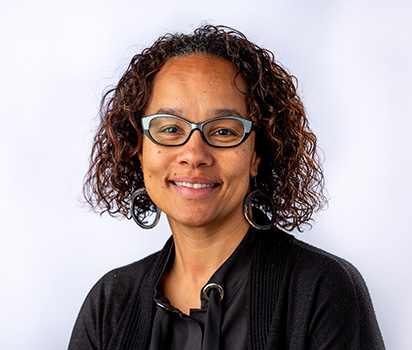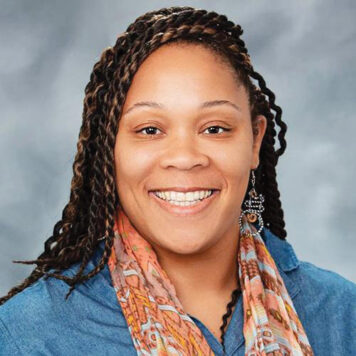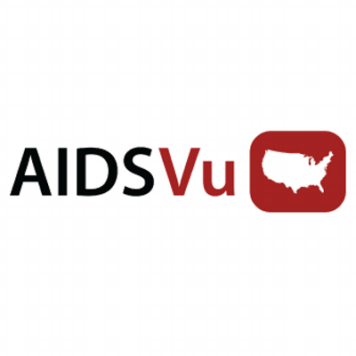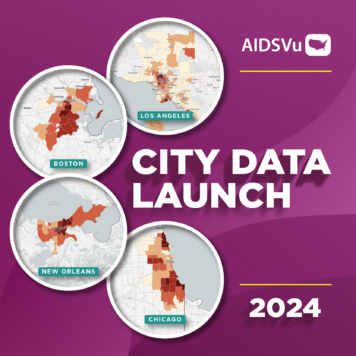Nadia L. Dowshen, MD, MSHP is a pediatrician and Adolescent Medicine Specialist and serves as the Director of Adolescent HIV Services in the Craig-Dalsimer Division of Adolescent Medicine at Children’s Hospital of Philadelphia (CHOP). She is also the Director of the Gender and Sexuality Development Clinic and a Faculty member at PolicyLab at CHOP. She is Assistant Professor of Pediatrics at the Perelman School of Medicine at the University of Pennsylvania.
Q: What motivates you to focus your work on young people and their sexual health?
I was in high school when the HIV epidemic among adolescents started to be recognized, so I began my career path then as a peer educator and have always been interested in working with young people to help them form healthy relationships and take care of their bodies so that they can achieve their hopes and dreams.
Q: Your research has utilized youth-friendly technology to improve adherence to antiretroviral therapy and health outcomes for adolescents living with HIV. What are the key things you’ve learned?
When I began taking care of young people living with HIV, one of the biggest challenges that they faced was having to follow a regimen of taking medicine every day at the same time. Young people living with HIV often have other issues in their life and may not have the support of family or community. Ensuring that they take their medication regularly becomes a huge undertaking.
I noticed that when I was speaking with my young patients about taking their medication, instead of paying attention to me, they were paying attention to their phones. This made me think that if they are on their phones all the time, then we have to use these devices to help young people empower themselves to take their medication regularly and be healthy. We started a study with daily text messaging reminders to try to improve adherence among youth, and it was successful in getting young people to take their medication on a regular basis. We are currently expanding upon that success to try and find more ways to increase adherence and engagement in care using an interactive app we created called Treat YourSelf.
Unfortunately, HIV is one of the few diseases in this country where you might go home and tell your family about your diagnosis and you may not receive unconditional love and support because of the stigma that still exists. One of the strengths of the app we built is that it allows young people to have an avatar and a screen name that is separate from their real identity. Due to stigma, many young people don’t want to come to an in-person support group, but they still need support from those going through the same things they are. They can now use their avatar and get support from their peers. Technology is ubiquitous in young people’s lives. It can be a helpful tool in improving their adherence and engagement in care.
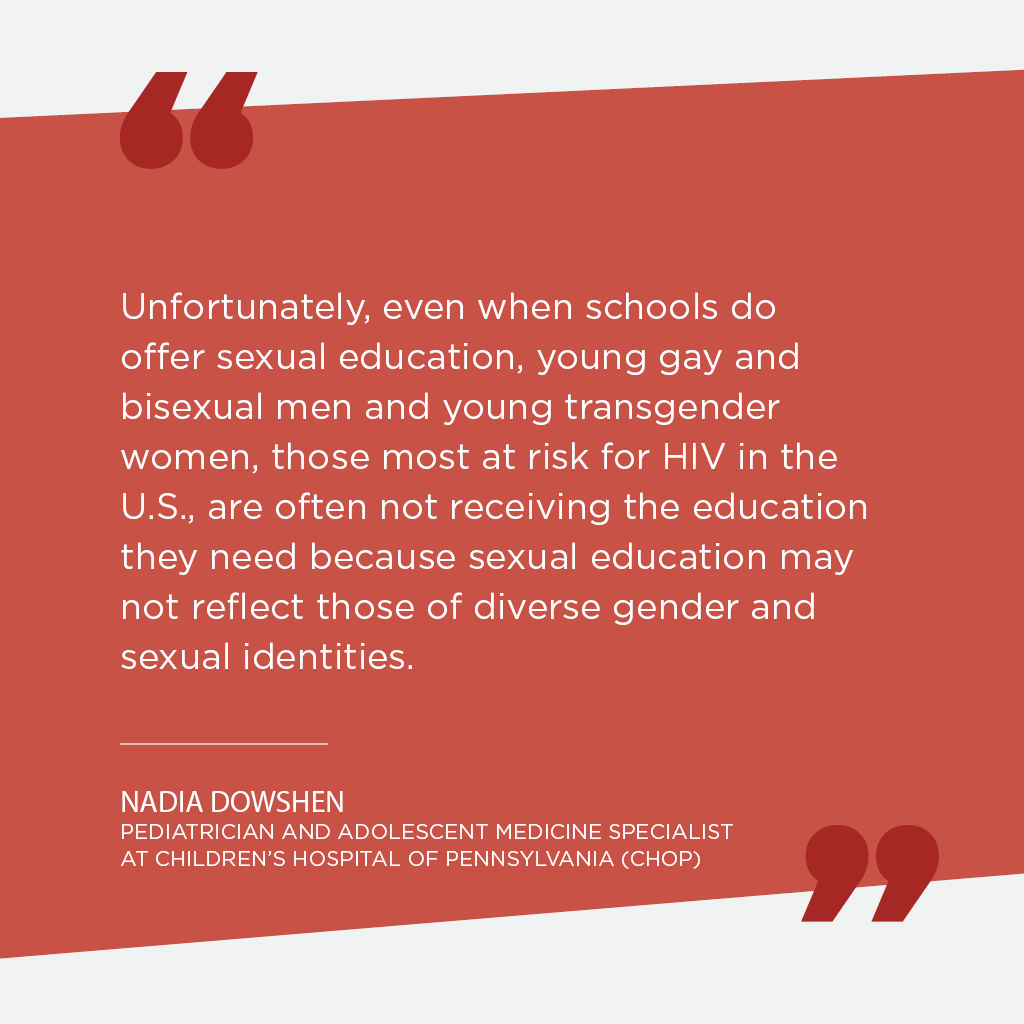 Q: You co-founded the CHOP Gender and Sexuality Development Clinic to provide medical and psychosocial support to gender variant children in Philadelphia. How do we better serve the needs of this population more broadly, and in relation to HIV prevention, treatment, and care?
Q: You co-founded the CHOP Gender and Sexuality Development Clinic to provide medical and psychosocial support to gender variant children in Philadelphia. How do we better serve the needs of this population more broadly, and in relation to HIV prevention, treatment, and care?
My experience in caring for transgender youth came through my work in HIV care. Transgender women, in general, are fifty times more likely to become infected with HIV compared with cisgender individuals. In the U.S. young transgender women of color are disproportionately affected by the HIV epidemic, and in some studies of adolescent and young adult transgender women, as many as one in four young transgender women are living with HIV. There are huge health inequities here.
My colleague, who was a mental health counselor at the time in our HIV clinic, and I developed a combined model of care for young trans women living with HIV. We wanted to expand our existing model of care for HIV to include youth across the gender identity and age spectrum. We hoped that if we started intervening earlier, we might be able to prevent these young people from showing up in our HIV clinic later.
However, the health needs of gender diverse youth go far beyond HIV prevention. These young people often experience so much stress and stigma that forty percent of transgender individuals who don’t have support from their families and communities report attempting suicide in their lifetime. We started the Gender and Sexuality Development Clinic to be part of giving transgender children and adolescents the opportunity to grow up to be happy, healthy individuals. We opened the clinic around four and a half years ago, and we now serve nearly 900 children and adolescents ranging in age from four to twenty-four.
Many of our discussions in the clinic center around our patient’s relationships and how that relates to their sexual and gender identities. For young people who are transgender and may be traumatized by parts of their body, and potentially going through a medical or surgical transition, the way they have relationships and explore their sexuality is something we have to be comfortable covering since they won’t often be able to find information that is sensitive and appropriate to their unique needs elsewhere.
Q: You were a member of the Board of Directors of the Sexual Information and Education Council of the United States, which promotes comprehensive education about sexuality. What needs to be done to ensure that adolescents receive the education they need to make responsible sexual choices?
In addition to young people having access to medical providers that are prepared to have conversations about relationships and sexual health, we must have comprehensive sex education in our schools and communities. There is an extensive body of evidence to suggest that youth who receive comprehensive sex education, rather than abstinence-only education, are more likely to protect themselves against pregnancy, STDs, and HIV when they become sexually active. Unfortunately, even when schools do offer sexual education, young gay and bisexual men and young transgender women, those most at risk for HIV in the U.S., are often not receiving the education they need because sexual education may not reflect those of diverse gender and sexual identities.
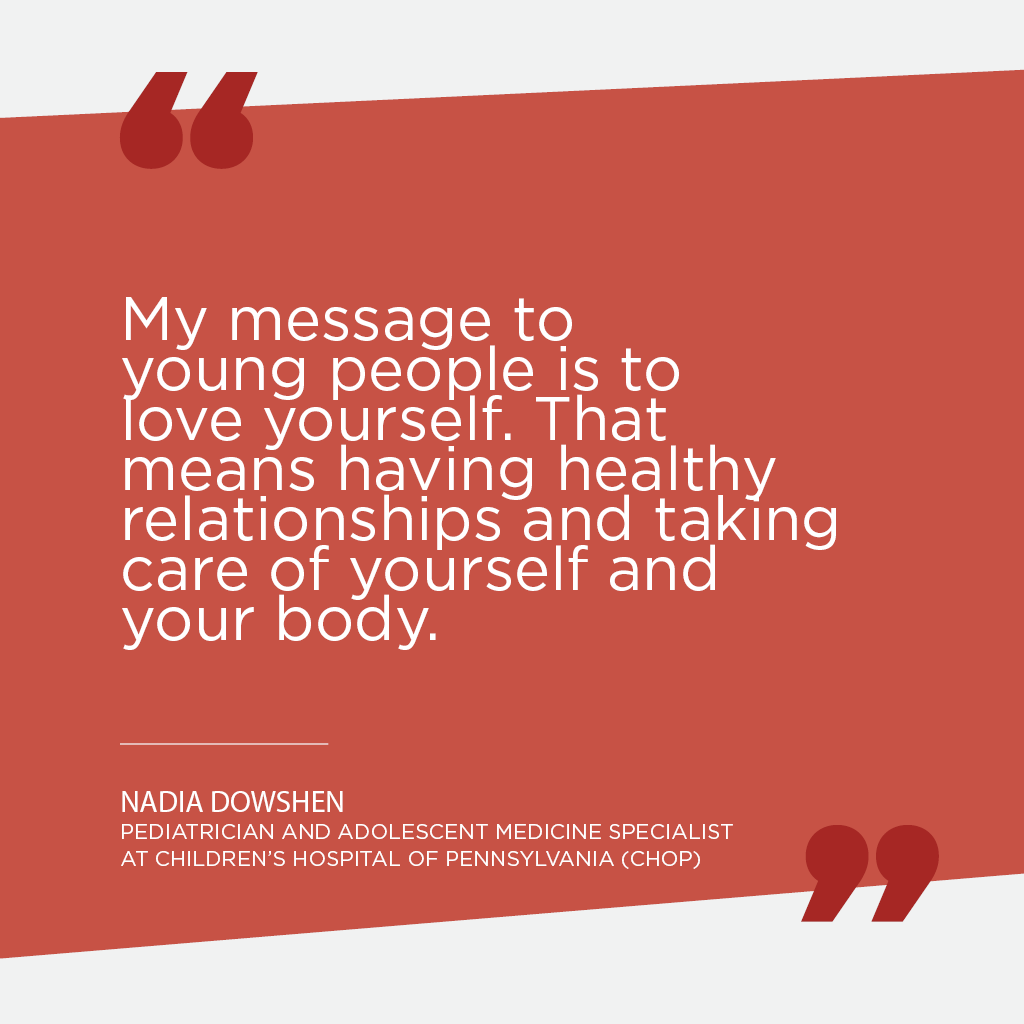 Q: National HIV Testing Day is on June 27. What is your message for young people on this important awareness day?
Q: National HIV Testing Day is on June 27. What is your message for young people on this important awareness day?
My message to young people is to love yourself. That means having healthy relationships and taking care of yourself and your body. You need to see your doctor regularly and get tested for HIV and other STDs. Young people shouldn’t be afraid to get tested because it is a normal part of taking care of your health. Unfortunately, medical providers don’t always bring up issues around relationships and sexual health that you need to talk about. So it’s also on you as a young person to make sure you discuss these issues with your provider and get tested so you can be healthy and know your status. In the meantime, it’s my job to work with medical providers to make sure they are comfortable talking about these issues and testing routinely for HIV like they do for any routine immunization for an adolescent.

